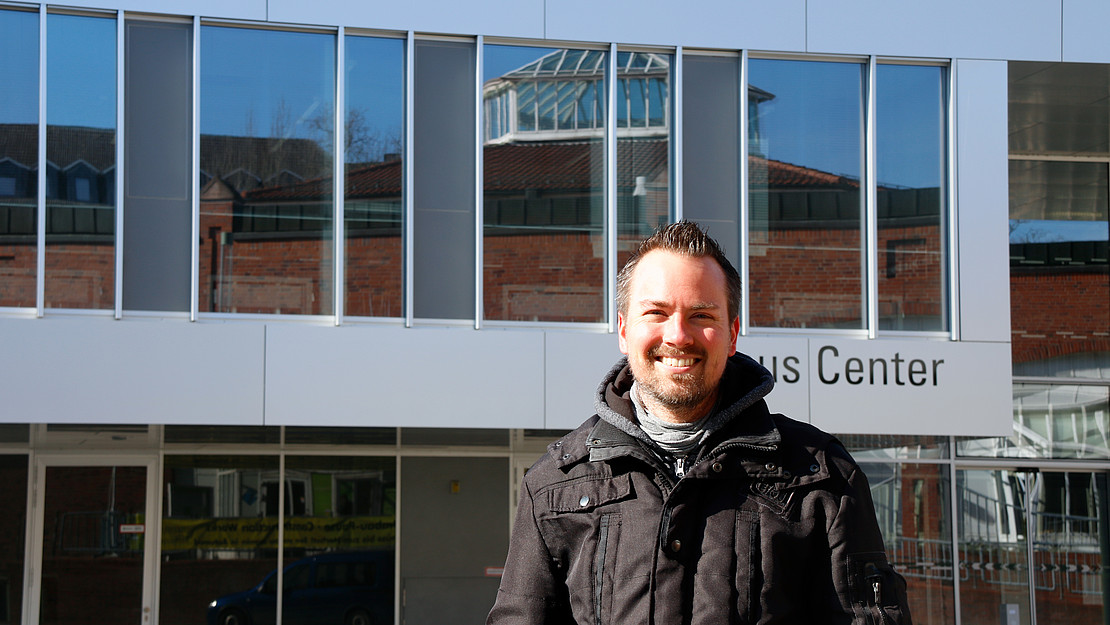This page contains automatically translated content.
Arthur Koestler's "Solar Eclipse" (1940) published for the first time in the original text - Spectacular find by a Kassel Germanist
 Image: University of Kassel
Image: University of KasselMatthias Weßel, a German scholar from Kassel, discovered the manuscript in the Zurich Central Library during research for his doctoral thesis. Koestler's "Solar Eclipse" from 1940 was previously only known as a retranslation from English; the first German version appeared in 1946. Until 2015, the original text was considered lost. The work of the famous Austro-Hungarian author is now being published by Elsinor-Verlag from Coesfeld.
Arthur Koestler (1905 - 1983) is one of the most important writers of the 20th century, especially in the English-speaking world. The multilingual cosmopolitan wrote his works mainly in German and English. From 1930 Koestler worked as a journalist in Berlin and shortly thereafter joined the Communist Party. After traveling through the Soviet Union, working as a war correspondent in the Spanish Civil War, and under the impact of the Stalinist purges, he turned away from communism. "Solar Eclipse" is Koestler's reckoning with ideology. The book tells the story of the fictional Russian communist Rubashov, who falls out of favor with the Soviet regime and into the clutches of the secret police. The novel became an international bestseller.
Until now, it was assumed that the original text was lost when the Jewish-born writer and journalist fled to England from the Nazis in 1940 under adventurous circumstances. When the Wehrmacht invaded France, Koestler was in Paris. While he was already planning his escape at full speed, his girlfriend at the time, Daphne Hardy, hastily translated the book into English. This affected the quality of the text. "The English translation was a rush job," says Matthias Weßel. The English text was the previous basis for the German editions of "Sonnenfinsternis."
However, Weßel found the original text under the title "Roman: Rubaschow" in the archive holdings of the Europa publishing house in Zurich. How it got there has not yet been fully clarified. When comparing the original text and the back translation, Matthias Weßel discovered hundreds of significant discrepancies. "In the translation into English and the back translation into German, many things have been polished," Weßel says. "Some idioms and allusions only become clear in Koestler's original manuscript," says the literary scholar. A direct allusion to Hitler, for example, is no longer recognizable as such in the retranslation. Even torture scenes in which dazzle lamps are used, which are depicted very drastically in the original text, have been toned down in the translation. "Certain scenes were even deleted completely," says the Germanist. In the first edition, for example, the publisher probably didn't want to subject the English-speaking audience to a masturbation scene: it was omitted without further ado.
"Even in the 21st century, there are good reasons to read Koestler," says Weßel. "That's especially true of the original text." The text, he says, is a valuable contemporary document. "It shows unadorned the dehumanizing language of totalitarian systems of the time, for example, using pest metaphors." Koestler recognized early on the connections between dictatorships of different ideologies, he said. "He was a chronicler of the decline of democracy and is therefore a very relevant writer again, especially today."
Titled "Darkness at Noon," the work enjoys great popularity in the Anglo-Saxon world. "The new edition should now bring Koestler, a German-language author, back into recognition in Germany," says Weßel.
Arthur Koestler: Solar Eclipse. Based on the original German manuscript.
Foreword by Michael Scammel, afterword by Matthias Weßel.
Elsinor-Verlag. Coesfeld 2018.
ISBN: 978-3-942788-40-3.
Press release on finding the manuscript 2015:
www.uni-kassel.de/uni/nc/universitaet/nachrichten/article/verschollene-original-fassung-des-romans-sonnenfinsternis-von-koestler-gefunden.html
Contact:
Matthias Weßel
University of Kassel
Email: wessel@uni-kassel.de
Sebastian Mense
University of Kassel
Communication, Press and Public Relations
Tel.: +49 561 804-1961
E-Mail: presse@uni-kassel.de
www.uni-kassel.de